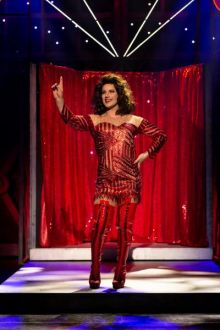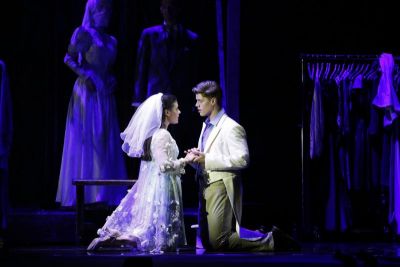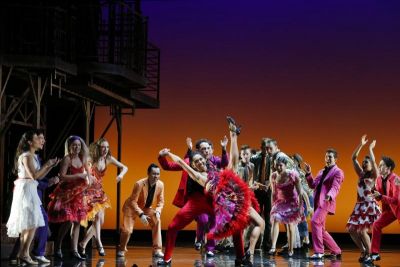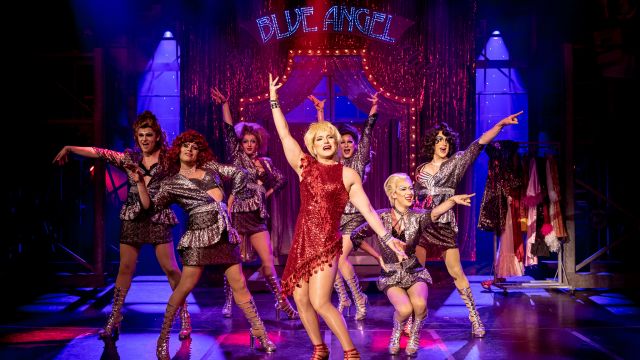Blind Casting Furore
Theatre companies in Australia are coming under attack from overseas networks about the ethnicity of their casts. It’s an issue that is causing grief in professional theatre, community theatre and in schools. David Spicer reports.
In April 2019, CLOC Musical Theatre in Melbourne released a statement on their Facebook page responding to criticism of their casting for the musical Kinky Boots.
“CLOC has a long standing 'blind casting' policy for all roles in our shows from leads to ensemble. CLOC invited auditionees of all shapes, sizes and ethnicities to audition for Kinky Boots,” the statement said.
“It was not a requirement of the show to cast a person of colour in the role of Lola and we cast from the auditionees who presented at the auditions.”
The reaction was furious.
Maureen Sherman-Mendez wrote: “blind casting” is coded language for “we’ll hire as many white people as we can get away with.”
Ari Aaron wrote: “If you don't find the right actor at your auditions for the role, you leave it un-cast and continue to search for the person of the right ethnicity to play it.”
Beau Rush wrote: “People are angry and are allowed to highlight how this is racist.”
The angry people were in large part from North America, who had a sudden interest in the casting decisions of a community theatre production on the other side of the world.
 Locals were more sympathetic. Peter Jovicic described the backlash as spiteful: “We have straight people playing gays, gays playing straights, clearly 20-year-olds playing teenagers, people of colour playing white people, but as soon as a white person is cast in a person of colour role, it’s discrimination, racism and whitewashing.”
Locals were more sympathetic. Peter Jovicic described the backlash as spiteful: “We have straight people playing gays, gays playing straights, clearly 20-year-olds playing teenagers, people of colour playing white people, but as soon as a white person is cast in a person of colour role, it’s discrimination, racism and whitewashing.”
The manager of the rights to the musical was fine with the casting. Stuart Hendricks, from Music Theatre International Australasia, told a forum at the Australian Musical Theatre Festival that “we want people to (stage Kinky Boots) as it is an important story.
“Kinky Boots is based on a true story. The original person was not a person of colour. The character morphed into an Afro American. The story is not about race but is based on acceptance,” he said.
Other shows have different rules.
“In Ragtime the cast has to be of colour. In one show Caroline or Change they have to be Afro Americans,” Hendrickssaid.
Individuals targeted by overseas networks have suffered from on-line harassment. Mathew Ward Entertainment cancelled a season of In the Heights in Brisbane in 2017.
The company was accused of whitewashing after posting pictures of cast members with a European heritage instead of Latino, as written in the musical.
Kim Ransley from Origin Theatrical told the Music Theatre Festival that after an “actor was attacked on-line, the local community was really worried about him. He was not checking into rehearsal. The producer said we have had enough and shut it down. It was horrible,” she said.
The festival was told that an actor who did not get one of the parts took the issue overseas and tagged the composer of the musical, Lin Manuel-Miranda. The issue was later reported in the New York Times.
“We don’t have (requirements for race-based casting) it in our contract for amateur rights. This production was only amateur. Everyone attacking them was overseas,” Ransley said.
Opera Australia this year came under fire for its casting of leads in the Handa Opera on the Harbour season of West Side Story.
The pivotal role of Maria was not cast with a singer of Puerto Rican background as written. Opera Australia’s Artistic Director Lyndon Terracini told the ABC: "It doesn't matter what their ethnicity is. I come from an Italian background, [but] that doesn't mean I should be the only person singing Italian opera."
The company’s colour-blind casting policy applies across the board. Most notably star singers from an Asian heritage have been given lead roles in operas with distinctly European storylines.
 Todd Jacobsen is playing Tony in the touring season of West Side Story. He says that “in 2019 we just have no excuse to not find someone who is culturally appropriate or equivalently culturally appropriate.
Todd Jacobsen is playing Tony in the touring season of West Side Story. He says that “in 2019 we just have no excuse to not find someone who is culturally appropriate or equivalently culturally appropriate.
“Our production has made an effort to cast the right people in their roles. It makes it more believable and right.”
Natalie Wood was infamously black face when she played the role of Maria in the 1961 movie.
“That looked incredibly odd,” said Todd. This year Stephen Spielberg is doing a re-make of the movie and is said to be casting it with ethnicity that is authentic.
The role of Maria in the touring production is being portrayed by Sophie Salvesani, who has Italian heritage, which Todd says qualifies for being culturally appropriate.
“In Australia we would struggle to have a 100 percent Puerto Rican cast,” he said.
The character of Tony is an “all American boy” of Polish heritage. Todd admits that he has a natural advantage in auditioning for cheesy white characters which are plentiful in the musical theatre world.
The issue also affects High School productions. Liz Bennet from Launceston College waited until she had the right mix of students to stage the musical Hairspray. She selected equivalent ethnic students for the roles of colour.
“We had Brazilians, children adopted from Ethiopia and some Aboriginal kids in the chorus. We did get a lot of criticism and couldn’t do it now,” she said.
“We had the most brilliant experience. After the show the kids gave us the most beautiful bunch of flowers to thank us for telling their story,” she said.
 The experience of segregation in the United States had parallels with what happened to them when they were in primary school.
The experience of segregation in the United States had parallels with what happened to them when they were in primary school.
Other schools with limited students from diverse backgrounds use other ways to stage the musical.
In Queensland, Sheldon College staged Hairspray this year conveying the diversity of characters through design. Most of the white cast members (particularly the racist characters like Velma and Amber Von Tussle) were in very blonde wigs and light-coloured clothing, while those playing African-Americans simply used their natural hairstyles and wore bright colours.
Stage Whispers reviewer Natalie Bochenski wrote that “for the most part, the conceit works well, even if hearing the word "Negro" used so often by white people is somewhat jarring. The word is faithful to 1962, the year in which the story is set; to not have it there would be failing to acknowledge the language used to oppress for generations.”
The backlash against non-professional theatre companies is very bruising. Companies such as CLOC make huge investments in sets and costumes which means once they reach the audition stage they can’t switch musicals.
The backlash seems certain to ensure that theatre companies will be more cautious when staging shows with non-Anglo characters in the future.
Images: Photos of CLOC's Kinky Boots by Ben Fon and Opera Australia's West Side Story by Jeff Busby
Subscribe to our E-Newsletter, buy our latest print edition or find a Performing Arts book at Book Nook.

